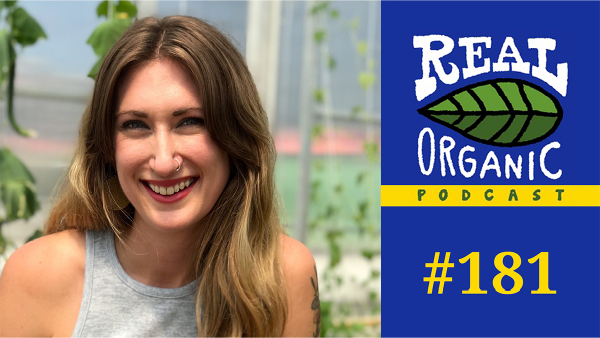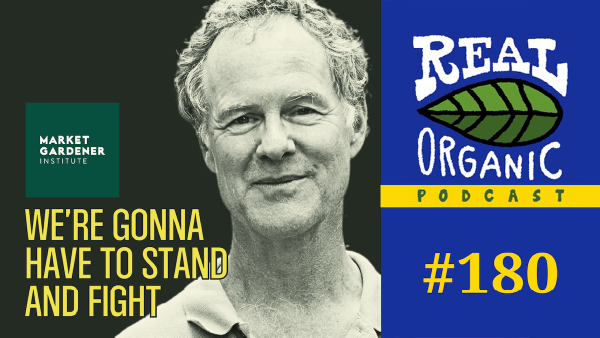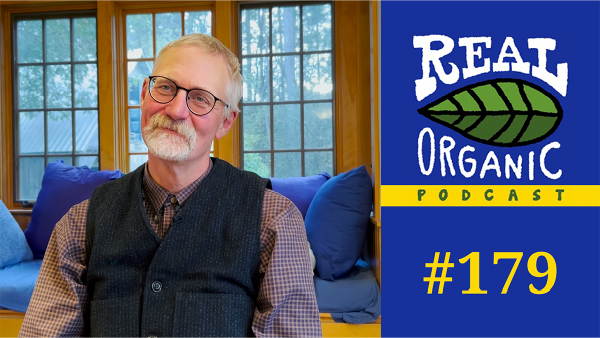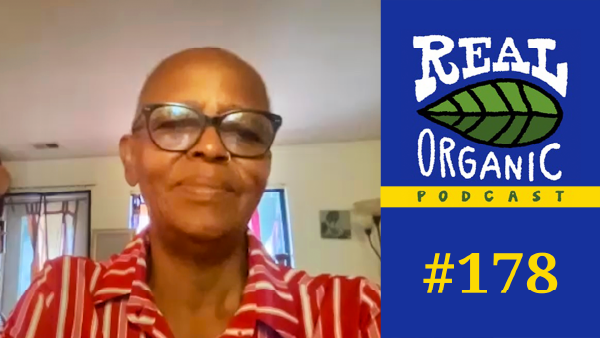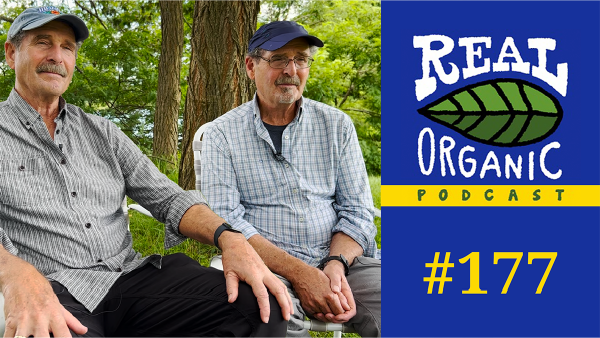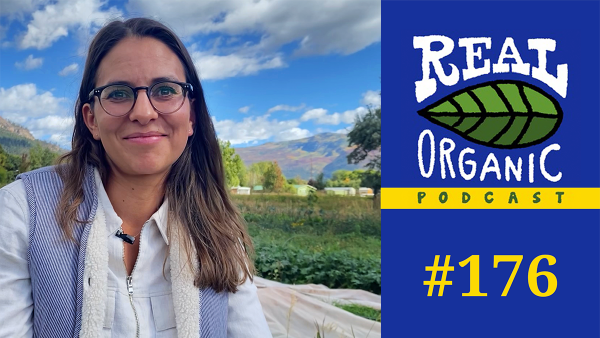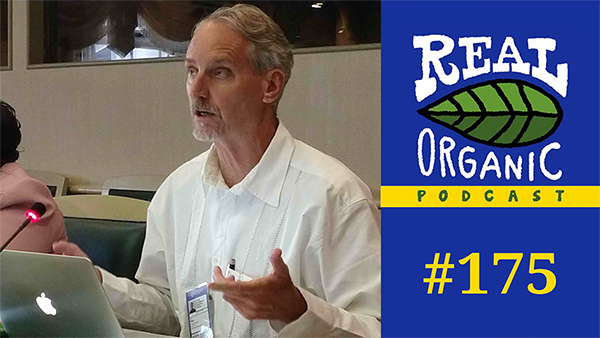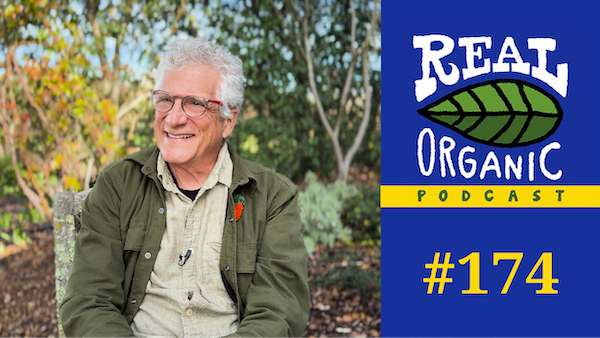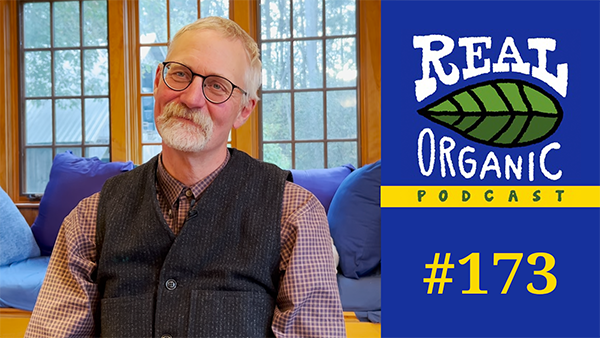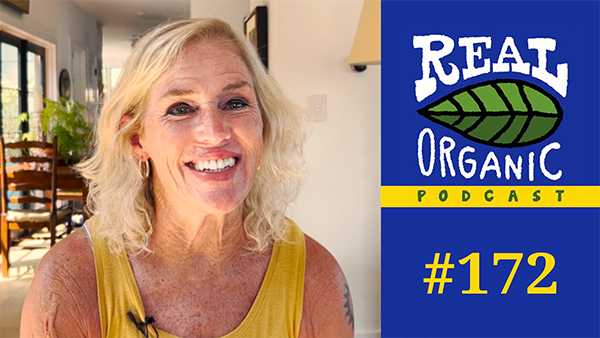Episode #168
Zephyr Teachout: Today’s Antimonopoly Movement Has Legs
Welcome! You can subscribe and download episodes of our show through your favorite podcast app.
You can also subscribe to receive the video version of each episode on our YouTube channel.
Our Zephyr Teachout interview has been edited and condensed for clarity.
Dave Chapman interviews Zephyr Teachout, February 2024:
Dave Chapman 0:00
Welcome to The Real Organic podcast. I’m very happy today to be talking to Zephyr Teachout. Welcome Zephyr.
Zephyr Teachout 0:09
It’s great to be to be on the show.
Dave Chapman 0:12
Yeah, I’m such a fan of your writing, and it was great to have you come and speak at the Churchtown conference last fall. There’s so much to unpack, so I’m going to focus on your second book. So you’ve got two books, ‘Corruption in America’, and ‘Break Them Up: Recovering our Freedom from Big Ag, Big Tech, and Big Money’. I have to say, I’m curious, just to kick off, that you pick Big Ag instead of say, Big Oil. What inspired that?
Zephyr Teachout 0:47
I have a lifelong interest in agriculture as I think we all should. Dave, you and I were actually both farm hands at the same farm a few years apart. When I was in high school, the way I made money was working on farms. I come from an agricultural, or formerly, more agricultural community. So, some part of it has to do with my own interest, but there’s a few other reasons why – when we look at monopolization in America, it’s so important to look at agriculture. One is that in many ways, agriculture was kind of the canary in the coal mine for what is happening across our entire economic sphere.
Zephyr Teachout 1:45
The farmers – berry farmers, chicken farmers, commodities farmers, across the board – really experienced the squeeze pretty early on as the American economic policy shifted in the 1980s and 90s to a top down concentrated power economic model. We can talk more about that. So, there’s real lessons and real wisdom in farming from that experience, and also the problems of concentration in ag! And I think there’s a few reasons for that: the problems in Concentration Ag and the effects of concentration in ag are well known in American history. The reason the Packer and Stockyards Act, which was an Ag specific anti-monopoly, law was passed in the 1920s and was a real recognition that with perishable goods, producers had a greater risk of being squeezed out, abused, and exploited by centralized infrastructure. That there are unique weaknesses in Ag that make it easy for centralized distributors to really grab power.
Zephyr Teachout 3:14
I got to tell you though, just as a matter of communication, it’s also easier to talk about Ag even though most people don’t know anything about it. But they feel like they do, they eat every day, they’re connected to it, there’s a deep connection. So, if we’re talking about, for instance, what’s happening with Uber drivers, or what’s happening with journalists on Facebook, the metaphor that allows people to feel like they have authority is to tell them the really horrible stories of what has happened over the last 40 years to farmers. Farmers play a really central role in the American imagination. That’s a long answer, but there’s a lot of reasons…of course, the most important is Ag itself. This is the center of our lives; you can get away with a lot of things, but you can’t get away with not eating. So, having a food system that is a broken system, which it really is, is fundamental to how our society is working.
Dave Chapman 4:34
Yeah. You know, when I was young, I actually grew up on a dairy farm down in Pennsylvania. And when I left-
Zephyr Teachout 4:40
Oh, I didn’t know that!
Dave Chapman 4:41
Yeah, Lancaster County. It’s right in the heart of Amish country; in fact, our farm is now owned by an Amish family tthat farms it. Beautiful land and amazingly fertile soil. When I left that, I had no interest in Ag, I had no interest in farming, and I certainly had no interest in the food system. When I came to Vermont, I got swept up in the excitement of the 70s, and I got excited about organic farming, and I became an organic farmer. So, I still didn’t quite get it about Big Food. When Monsanto was taking over, I didn’t quite get it – what’s this about seeds? But, I’ve come to see how really important this is to everything, to democracy.
Zephyr Teachout 5:38
Everything. Yes, exactly. Yeah. You know, Monsanto is just one of many stories, but it’s a very important story. A friend and colleague of mine sometimes describes what happened in the 90s as like the second Enclosure Movement, where it is taking away from the public that which had been the public, and the court cases allowing for the ownership of seeds, and the biological structure of seeds. Such a radical part of this story is – it’s not what I focus on in my book – but within food, you find so many different parts of the distortions and tyrannies of the economic model foisted on us after the crisis of the 70s.
Dave Chapman 5:40
Yeah.
Zephyr Teachout 5:51
So, you know, we’re at a turning point right now, I hope. I hope – knock wood! But, it’s turning very slowly, we’ve got a lot of work to do. As I write about in my book “Break Them Up”, one of the things that was really robbed from our political discourse was ways to talk about corporate tyranny. We were kind of told that economics is for the experts, and there’s a real split: there’s economic expertise, and there’s democratic expertise, and those two are different arenas. It’s a real labotomization.
Zephyr Teachout 7:44
So, farmers in the 1870s, 1880s, were leading the anti-monopoly fight, and part of what we are also recovering is the long history of anti-monopoly activism in this country, and globally, at this moment – that’s exciting. Farmers have always been at the forefront of that. Not alone, but they’ve always been central. They’re absolutely central to the Granger Movement – the early creation of the first federal utility, the Interstate Commerce Act, and the regulation of railroads – that’s farmer driven! Creativity is important to me, and creativity as a vision of what soceity should look like is important to me. Really creative and angry movements built, and are building, some of the real crown jewels of American government.
Dave Chapman 8:57
Okay, I want to dive into all of that, but first, just one last question as a setup. You say ‘Big Ag’ in your title, we’re recovering our freedom from Big Ag, Big Tech and Big Money. I actually mostly talk about Big Food now. I don’t talk about Big Ag, because agriculture is so embedded in distribution and retail, that it seems like we have to talk about that whole system.
Zephyr Teachout 9:25
Say a little bit more about that, that’s interesting. I’m totally open to that.
Dave Chapman 9:31
Well, we face – I mean, one of the many crises that we face right now is a health crisis in America, which is certainly about food, but it’s really something that’s done in complete alliance between the retailers and the processors. Actually, I think the farmers are almost innocent puppets in this.
Zephyr Teachout 9:58
Oh, okay. Yeah, so, when I think about Big Ag, I’m not thinking about big farmers. I’m thinking about distributors. I’m thinking about Monsanto. I’m thinking about ADM.
Dave Chapman 10:16
Are you thinking about General Mills and the other big processors?
Zephyr Teachout 10:21
Yes, those are all sort of collected. As you know, I was involved in politics, and I’m still involved politics – but not electoral politics – for a while, and I’m interested in language that is really distancing, a language that’s accessible. So, I am open to this, and I see how Big Food consice; right away, you don’t have to do any steps. You’re talking about what’s happening every day that people can touch, and imagine. I really get the appeal of that.
Dave Chapman 10:59
That system is not designed for our benefit – you know? It’s designed to profit off of us.
Zephyr Teachout 11:09
Yeah.
Dave Chapman 11:10
I think that’s a really important thing. Okay, so Big Ag is part of big food. Let me ask the big question – you think and talk a lot about democracy, and how all of this bigness impacts democracy. For me, this was my critical understanding, because when I got into this, really, I was just a small farmer. I still am! And I’m like, what’s going on? Why, are we seeing this one little bit of the food system that is ours, that we created in the Organic Movement. Why is the National Organic Program being deformed almost beyond recognition? I’ve put it up to a failure of democracy, because we, the people who created it, the farmers who are part of it, the eaters who are seeking out, none of us wanted this!
Zephyr Teachout 12:05
No. Let me tell you a story which is both a true story, but also a parable that helps describe where we are. Same is true in Berries, but what I talk about in my book is Chickenization. After the 1970s, the crisis of the 70s and the crisis of confidence in democratic economic systems: when Reagan came into office, one of the first things was just rip the bones out of anti-trust enforcement. He brought in people who basically – speaking of defunding – he basically defunded the anti-trust cops.
Zephyr Teachout 13:01
There was a radical drop in enforcement, the number of cases brought, the kind of cases brought, but probably as important, was this whole new theory that was brought in. This new theory was anything that is ‘efficient’ – so, efficiency becomes this new, almost godlike, North Star. Anything that we think is going to increase prices is bad, anything we think is going to decrease pricesis good, and we’re going to assume that businesses are going to decrease prices. So, there’s a few different steps in there. The thought was that buisnesses will be out there in that raucous marketplace, so they’ll have to decrease prices. If somebody wants to buy something up, they’ll buy it up. This leads to radical consolidation in many different areas, but let’s just talk about distribution in the Chicken Industry.
Zephyr Teachout 13:58
As of really about 10 years ago, you now have four big players – think Tyson or Pilgrims – who sit as middlemen between farmers and the market. If you are in an area, they kind of divide up the country a little like mob bosses: here’s your region, here’s my region. And this is live produce! So, it has to be near a processing plant. After both gobbling up competitors, and gobbling up different parts of the supply chain and the distribution chain, they then sit like little kings over the farmers. They’re no longer cooperating in a marketplace, but really governing them, and this is what that means for for contract farming, for chicken contract farmers. It means that they look free in the eyes of the law, they count as independent farmers, they count as the American Dream owining your own land and running your buisness any way you want. But, they can’t use their own feet, they have to use whatever Tyson tells them. They can’t use their own lighting system or decide what time to turn the lights on up and down on the chicken, they can’t use their own heating system.
Zephyr Teachout 15:25
Then, when they take the chickens or get picked up, they are paid different amounts every month in a thing called a tournament system. They’re basically pitted against all the other chicken farmers in a contest of who can most efficiently produce that chicken for sale. But it’s a contest where you don’t actually get to know what your neighbor’s did, you don’t actually get to talk to them, you don’t even know what they’re paid, and you don’t know what you’re going to be paid. So you’re in this state of real, rational paranoia, where how much you get paid goes up and down one week after the next, one month after the next, and you don’t know if it’s because you are in fact winning or losing in this tournament system. This is where it hits the road on democracy. You know that if you speak up, you might be punished. There’s a recent case that didn’t get anywhere which is part of the problem with the law: a farmer in Alabama joined an organization designed to advocate for changing the laws, and she gets cut out of the system, she just loses the contract.
Zephyr Teachout 16:57
And, in 2010, when Vilsack and Holder came around to do hearings all around the country, a lot of farmers came, they came and they told their stories. But a lot of farmers did that with terror, tears, real fear, that telling their stories would lead to them basically going bankrupt because, by the way, they’ve been free to take out the million dollar loan on their chicken house. But, that freedom means that they’re constantly terrified that their entire world will collapse if they lose their contract. They need that contract. There’s so many farmers whose tongues were effectively cut out by this system. They were living in a tyrannical system. Besides, besides going to jail, the worst thing for most people is losing their job. But what’s worse than losing your job is losing a job and going into debt. The duress that these farmers live under is extraordinary.
Zephyr Teachout 16:59
One of the things the Baron de Montesquieu said, who was a real theorist who influenced the American rebellion against the Brits, and who set up a system of distributed power, is that signs of fear are the signs of tyranny creeping in. When you see farmers start to be scared, and when you see that fear, that is a sign that it’s really hard for those to come together collectively, because there’ll be some that are brave and, I admire them, but I talked to a farmer who had spoken up, and he tells stories of being shut out. Of course, you can’t prove it because you’re already living like in a panopticon. You’re living where you can’t know why you’re being paid that way you’re paid. It’s a real state of being governed, and that should be totally antithetical to a democratic system to be governed in that way.
Zephyr Teachout 16:59
You know a lot about the challenges in the Organic sector, the Real Organic project has done a great job of facing them. One of the things that you see in berries, for instance, or other areas, is that the Big Food will allow some small sector of the market, 3-5%, they’ll allow them to exist and point to that as evidence that they aren’t in control. We see this with beer too. The Beer Industry is totally controlled, but they allow for a little corner of artisanal beer – right? There’s a gross element of grace, like they are allowing them to exist, but they know they could crush you if they needed to. That is also not democratic, because mechanisms – I think there are some direct to market mechanisms that can’t be crushed, but the mechanisms are by way of the grocery stores.
Dave Chapman 20:34
Right.
Zephyr Teachout 20:35
So, the grocery stores need Driscoll because Driscoll is the game in town, right? They’re not going to have a grocery store without Driscoll berries, people will stop coming. So Driscoll has them over a barrel, and if Driscoll makes clear that you’re not going to carry that cooperative’s berries, that cooperative’s berries aren’t going to be carried in that grocery store.
Dave Chapman 21:00
We actually see that happening, for sure.
Zephyr Teachout 21:04
Oh, you do?
Dave Chapman 21:04
Yeah, because even with whole foods, which is the closest to a chain that is an alternative to the other chains – and it’s not – but it’s as close as we have. To sell berries to Whole Foods? Now you have to go through the Global Buyer. You can’t even sell to the regional warehouse, let alone the store without permission from the Global Buyer. How did that deal come about, I wonder. So, interesting thing, Driscoll themselves have, amazingly, claimed to be over 70% of the Organic berries sold in America. That was by their own their own claim, and I think somebody just wasn’t thinking very clearly when when they said that. That’s more than Rockefeller had with Standard Oil when it was at its peak.
Zephyr Teachout 21:55
Yeah, it was at 64%.
Dave Chapman 21:57
Yeah! So that’s totally a monopoly by any standard, and as I understand it right now, on the statutes, that’s illegal.
Zephyr Teachout 22:08
So, in American law, you can gain market share of that level if you do it without using various anti-competitive techniques. I don’t know enough about the history of how Driscoll grew; it seems quite possible that mergers were a part of that growth. You probably know that history. But American law does not ban the existence of 70% market share. It intervenes in a few different ways: it doesn’t allow for the abuse of that, or what we call monopoly maintenance, which is basically engaging in behaviors that allow it to protect that power, as opposed to just making better berries.
Zephyr Teachout 23:10
The challenge we have now, Dave, is that because for 40 years – yes, it was Reagan- but absolutely it was Clinton. Yes, it was Bush, but absolutely it was Obama. There was just a straight line with small variations on the theme of efficiency is the god for 40 years! We now have concentrations like the one with Driscoll, and I don’t know enough about them, I haven’t investigated so I can’t say they’re not breaking the law now. But we have allowed this accumulation of power to the point where even if our law is aggressively enforced, it won’t always be able to address it.
Dave Chapman 24:00
Yeah.
Zephyr Teachout 24:03
So, push me and others to look deeper into what Driscoll itself is doing, and not just what percentage market share it has. There’s some of you who are probably sitting there and I – speaking of language, it’s an unfortunate feature of our anti-trust language. Monopoly has the word mono in it. Mono. You guys are farmers, you’re used to mono culture, mono, one. It has the word one in it, but it does not mean one, and you just gave an example of that. There’s no economists who would say that you need to be the only game in town to be a monopoly.
Zephyr Teachout 24:57
What Milton Friedman – a great recent book was called “The Last Neoliberal” about Milton Friedman – I hope he’s the last neoliberal *laughs*. What Milton Friedman – so, the epitome of the Efficiency Consumer Model of the economy, describes monopoly as a company that has the power to unilaterally dictate terms or prices. So, I can’t speak to Driscoll, but I wouldn’t be surprised if that’s true. They’re not engaging in price negotiation with a grocery store. They are telling Whole Foods what the price is, it’s a dictation. When you think of monopoly, you can have a monopoly at a much lower level, at 30% or 40%, if you can dictate the terms outside of as opposed to making it a negotiation effectively.
Dave Chapman 26:00
What I saw, and actually, when I first encountered Driscoll is it wasn’t about price, it wasn’t even about shelf space, it was about influence on the USDA. It’s my personal belief that Driscoll is the reason that hydroponics are permitted in Organic certification. If Driscoll wasn’t growing hydroponically, I think it would be banned and prohibited. There was only one reason why it was permitted, and that was because the second biggest Organic produce company in the world told somebody very close to the Secretary of Agriculture that it should be permitted. That’s my belief. I have experiences to support that understanding, but I can’t prove it because I would have to, like, subpoena the person who was close to Vilsack and see if she would tell the truth under oath. Undoubtedly, I know for sure that there was influence being expressed, and I saw cases where I felt we were actually going to win in the beginning, which surprised me, until the people we were negotiating with realized that Driscoll was growing hydroponically. And suddenly, the conversation changed very much.
Zephyr Teachout 27:16
I do not know, you have a lot more experienced, but this is wholly plausible, right? In some ways, it’s just so crazy that if you talk to any human, you can’t separate economic and political power. There’s this really fantastical idea, in American history but certainly in world history where you can separate the two. That you can have a economic model that looks only at efficiency and doesn’t worry about power, and then over here have election law, and near the twain shall meet. Of course, the twain meet, right? Of course they do.
Zephyr Teachout 27:59
As Justice Douglas in the Supreme Court said in 1950: all power tends to form into a government of itself. Power is the question, and when you have concentrated power, it becomes governing power. It does so in two ways: one way is direct governing – that was the Chickenization story I was telling you, and I know this happens in berry farming, that a lot of the berry farmers who are suppliers to Driscoll are not employees. Some of them are probably Driscoll employees, but a lot aren’t employees. They’re probably fundamentally governed and don’t feel like they have free expression, or can’t be creative learning and engaging with the soil – they aren’t even allowed to learn!
Zephyr Teachout 28:58
This is, I know I’m going off on a sidetrack, one of the things that’s so maddening is the way in which even the intimate knowledge that farmers have of their land stops being theirs, their ability to care for the land. That is one way to feel that governing weight. But the other way you’re talking about, which is so important, is that once you gain that power, then your levers over formal governing power become enormous. Some of the levers are the crudest funding campaigns. A lot of times you probably don’t need to fund campaigns, like if you’re in a berry district. You just need the politicians to know that you could fund campaigns to destroy them. A lot of the money and power in politics is latent. It’s not used, it’s just sitting there as a fearsome bear around the corner; politicians do not want to unleash that bear, so they have the direct power over campaigns. Then you have lobbying power, and lobbying power is enormous.
Zephyr Teachout 30:13
And it happens in the direct way where there’s the explicit lobbying meetings, but a lot of lobbying is what we call shadow lobbying. It’s not on particular bills, it’s insinuating yourself in the culture, it’s reports, friendships, cocktail hours. And then, companies like Driscoll have another source of power, which is just the fear that if you pull the plug on them, that if you hurt them, you’ll hurt the economy, or you’ll hurt the part of the economy you’re responsible for. The too big to fail threat? So obvious in the banking crisis of 2008. They said: you can’t regulate us in certain ways, we get that you need to regulate us in a few ways, but if you destroy us, the whole thing goes up. Basically, we’re holding you hostage, if you aim at me, you aim at the country. Without knowing the particular claim you make, I believe there’s no doubt that Driscoll has that kind of power. That the fear of regulators, of taking on a company like that plays such a central role in potential destabilization. That fear leads to a lack of regulation.
Dave Chapman 31:45
Yeah
Zephyr Teachout 31:46
No doubt.
Dave Chapman 31:47
Yeah, we see it. Let me ask a related question, kind of the next step, which is, let me speak for someone who is dear to me. And they go: yeah, but people with very low income can shop at Walmart and get cheap food – are you trying to take that away from them? This system, which I think is so destructive to those same people, and gives them inferior nutrition. I actually think that system gives them a very low pay. That whole system that holds them down is also offered as a lifeline. What would you say to that?
Zephyr Teachout 32:37
Well, there’s two answers. I’ll give you the easy answer first, but then let’s talk about the deeper question. The easy answer is that after 2020, we have seen what Big Food does with its power. And what it does is in a crisis, it raises prices. So, the whole promise – you know how people like to say nowadays they had one job? The whole promise of the – I’m going to use the Chicago School as shorthand, the efficiency bigger is better, let companies self regulate. That model, you can call it the Chicago school, the whole promise of the neoliberal school was that you’ll get cheap prices. We’re not going to talk about democracy, that’s somebody else’s job, but we can promise you cheap prices. Well, they failed at that job, and the consumer price index from 2020 on is starting to come down. But, what people were paying for meat?
Zephyr Teachout 33:58
Take Tyson, and I’m talking broadly, I was involved in the New York Ag price gouging investigation so I’m talking just from the outside. Not from an investigative front but from looking at the outside, in their reports to shareholders, they boast about their profit margins increasing during the COVID crisis and after the Russian invasion of Ukraine. Their prices are going up and their profits are going up. There is a report that just came out by the Groundwork Initiative, which is a great group of economists researching this question of what issometimes called Greedflation. They argue that half of the consumer price increases of the last few years are due to companies who do not have increased costs, but who are just raising their prices. Maybe I’m being too complicated about this. Once you allow somebody to have a choke point power, they’re going to rob from their workers and they’re going to rob from the consumers. They’re going to rob from the suppliers.
Zephyr Teachout 35:17
Because once you have a choke point rule you have nowhere to go. So yeah, maybe it’s cheaper the first few years, but in the long term, it is not actually a protection against low prices. That’s the easy answer, which is they tried, they failed. Diapers are too expensive right now, and that’s because the diaper duopoly, after having used its power to suppress worker wages, is now using its power to take parents and charge them more per each diaper. The deeper question, though, is not that. The deeper question is, and this is the really long, hard work of collectively imagining an economy that we want to live in. The deeper question is – I don’t have any doubt that monopolization leads to inequality.
Zephyr Teachout 36:16
Oxfam, speaking of Big Food, came out with a terrific and devastating report about how consolidation in the food industry is a driver of global inequality. So, you’re gonna have fewer pennies in your pocket when you go to the store, which is why you’re going to want to go to Walmart in the first place. The deeper question is, we don’t want to live in a society where price is the only value. Yeah, price has value, but it is not the only value. Being well paid, being secure, has a real value. Quality, which is theoretically taken into account in current antitrust, but in practice and especially in prices, isn’t. Quality has a value, there is a value in having local communities where you can go somewhere and buy stocks downtown. There’s a value in having a pharmacist that pays attention to your health needs and isn’t wholly dictated. There is a value to having farmers who can use their knowledge to take care of the land and food. Those are other values. And so the short answer is they failed, give us a chance. The longer answer is, when we have that chance, now that we’re starting to have that chance – it’s hard if somebody’s at the edge of edge of a cliff!
Dave Chapman 37:46
Yeah.
Zephyr Teachout 37:49
But higher employment allows that conversation to happen. Now, when you have record levels of low unemployment rate, then you can start to have the conversation. But you have to have those record levels last. If people feel unstable, and have $400 in the bank, and nobody they can call the co-sign alone, which is a lot of America right now, then it’s hard! I don’t mean to under undermine the first thing, It’s like, Tyson isn’t getting a cheaper chicken right now. What do you what do you think? I mean, this is not secondary for the Real Organic Project, this is sort of central to the Real Organic vision. Unless the Real Organic vision is we’re going to be at 3%, we’re just going to live in our corner and just leave us alone, which I know isn’t your vision?
Dave Chapman 38:54
No, I’d like to be 50%, and our country would be better for it in in almost every way. I see that – have you ever heard of the Goldschmidt thesis? It’s a very interesting thing. It came out of California and was a study done in some department of the USDA back back in the 30s. This guy, Goldschmidt, did a study of two towns in California. They were both agriculture towns, and they were both about the same population. One town was completely ringed by corporate farms, large centralized corporate farms, the other was entirely ringed by small farms, family farms. He looked at the difference between the two towns Oh, yeah, this guy was alive until like, you know, 1990 or something. And he did all kinds of other work. But that work was shut down by the government.
Dave Chapman 39:45
They didn’t like his punch line. His punch line was that the people who lived in the town with a small family farms was the town you wanted to live in. It had great schools. It had caring police force, it had public park works. It had lots of civic organizations, it had thriving churches, it had low crime rate. And the other town surrounded by the corporate farms was the town you didn’t want to live in the town that felt unsafe the town where there was a lot of poverty, the town in which there was a big division between rich and poor, and a town in which most of the money actually went somewhere else because the people on those farms live.
Zephyr Teachout 40:24
Oh, that is so interesting. I mean, it sounds to me like what happens with Walmart and dollar stores – they come in with promises that are about you know, 1/80 of the elephant, but then the rest of the elephant is sick and dies. So you got your patch! Knowing which part you get, you’ve got your patch, and then in the end, you usually lose that. What dollar stores are doing, what Walmarts are doing – they come in with promises, but the money isn’t staying, the knowledge isn’t staying, the sense of ownership isn’t staying. Look, there’s a lot to be really worried about.
Dave Chapman 41:09
Yeah
Zephyr Teachout 41:11
I do think that we are in what the theologian Paul Tillich called a Kairotic He’s talking about in terms of the use of the word Kairos in the Bible, but, Kairos as opposed to Kronos, or just chronological time. Then there’s times where there is a sense of possibility and opening, there’s often a lot of chaos, but there is an opening. Now, people are so unhappy, and they can feel they’re lonely, disconnected from land, food, each other, community. We’re living isolated lives, and there’s a hunger for… To me, this isn’t an accident of technology, this is a series of policy choices that we made.
Dave Chapman 42:24
Yeah.
Zephyr Teachout 42:24
And so, part of what I want to get across – I know it’s not everything. I know that. I know that these policy levers aren’t everything, but the anti-monopoly vision, or returning to a plural economy with genuine local creativity and generativity where people are free, and not just free to go to the polls once a year, but who live freely. It looks a lot different than what we have now.
Zephyr Teachout 43:01
Yeah.
Zephyr Teachout 43:02
Right? It’s a little about the individual tools and the great work that Lena Khan is doing at the FTC and the great work – it’s a little about that, but some of it is about wholly changing what we think an economy is for.
Dave Chapman 43:19
Right? Well, yes! Back to Schumacher, right? This idea of an economy built as if people mattered.
Zephyr Teachout 43:30
Yeah
Dave Chapman 43:30
So tell me, because this is the hard question. I mean, the easy thing is to go: look at what’s happening, this is wrong. The hard thing is to say, I wonder what we could do about it. It’s not like you should have the answer to this, but I think that we’re all wondering, and almost desperately. People are truly, truly hungry to find a meaningful path where they could build the world that they want to live in. People are scared, and, you know, a lot of people feel broke, a lot of people feel poor, a lot of people feel threatened and in danger. So tell me your thoughts about – I don’t know if we want to call it an anti-monopoly movement or a pro-democracy movement, I think those are the same things.
Zephyr Teachout 44:21
Yes, they are! So, we are in the third year of a descendants of a real anti-monopoly movement having power in this country. It can be hard to see depending on where you are, but a former agriculture reporter who wrote about both problems with Monsanto and chicken farming became a law student, then a law professor, and now runs the Federal Trade Commission – this is Chair Lina Khan. Now, you may think: ah, she’s not touching my life, I hear she won some cases that seems very technical and distant. I will tell you who does not think it is technical and distant – the Wall Street Journal. The Wall Street Journal has written an op-ed against Lina Khan 100 times, as of today, since she took office. The financial elites who want to say that we have a competitive market but but really, are controlling, are sitting atop the market. They currently have both wealth and power. They know how threatening this is. I say this because it is not a simply a technical matter. Lina Khan’s success in starting to challenge mergers, actually blocking those mergers, changing the vision of what our economic policy is, is a core attack on this top down capital controls, people don’t matter model.
Zephyr Teachout 46:17
Taking on private equity roll ups where they buy up nursing homes and people have to sit in their own sh*t – excuse my language – because the private equity does not care about the people in those nursing homes. I’m using these words on purpose: they want to tell you that this is an open competitive market. This is a sclerotic, top down, money driven market, it is not open, and Lina is taking that on. Similarly, Jonathan Cantor at the Department of Justice – he’s lost some cases bringing price fixing cases against distributors. But he’s established great precedent to build the next case, and he is not part of – speaking of chickens – what we call the chicken sh*t club, which is a group of prosecutors who won’t dare loose cases and thenthey don’t actually do anything. So their job, our job, our collective job, is to say: okay, I don’t think about this, that’s not my world. But we have a very important job in saying yes and more. They are taking on the heart of power, and there is nothing that Capital would like better than for the rest of us to sit back and say, too complicated, antitrust, these are technical, doesn’t affect me. There’s nothing they want more than to say it doesn’t matter. It matters. It really matters.
Zephyr Teachout 47:56
Look, I think VilSack’s been a disaster, just a total disappointment. In other areas, Biden has been extraordinary on these issues. He gave a speech saying our last 40 years of trickle down economics is a failure. That’s an amazing moment. A failure! He wasn’t nice about it, you could even see how angry he was. He was like: wait, we’ve allowed all this concentration, workers aren’t getting paid, this is a failure! You don’t have to agree with Biden’s own vision of market capitalism to cheer that on, but to recognize that Jake Sullivan, from the Biden administration, is saying the end of neoliberalism in the global order. Katherine Tai at the US Trade Organization saying we’re not going to negotiate, we’re not going to use trade deals to stop regulation locally – it’s a big deal! The ship is turning a little bit. It can be hard because there’s so much else you might want to complain about, but we got to get on board. You don’t have to approve everything, but recognizing that that’s a big deal, and not wallowing in our own desperation is key. So, that’s one part of it. Another part of it is what farmers and others are doing in showing that it can happen, showing what it looks like, even in a totally broken system. We do have to be careful we don’t pretend it’s a fixed system, it’s not. And the third – well, you and I had a friendly debate on this in Old Church-
Dave Chapman 49:39
In Churchtown, yeah.
Zephyr Teachout 49:41
Yeah. But what I really think, maybe because of what I was saying before, is that there’s nothing more dangerous than feeling defeated by politics, and feeling like it can’t change. Do you remember “Thatcher-Tina, there is no alternative”? Right? “T” “I” “N” “A” – do you remember?
Dave Chapman 50:09
I don’t.
Zephyr Teachout 50:10
Okay! So, Thatcher, and the austerity politics of Reagan, were defined by the slogan “TINA”. There is no alternative, we have to go this way, austerity is the only way we can survive. At the time – granted, I was like eight, so this is from reading not from my personal expereince. But at the time, the Progressinves and the Left were like: no, it isn’t “TINA”! There are lots of alternatives, there are lots of ways to build an economy. We can be involved in government, we can do these things! But I do sometimes worry that Progressives have just bought Tina, but the negative version. It’s like: unless we get rid of capital markets, we’re done. They’ve created an impossible hurdle, and therefore use that to justify checking out of politics. We’ve got to not check out. So, you aren’t, I mean, the work you’re doing is so central. Right now, it looks lik you’re losing when you’re in your efforts at the Department of eggs, like it’s not working!
Dave Chapman 51:29
We’re losing in terms of governmental reform, but we’re not losing in terms of building a movement to create an alternative to that.
Zephyr Teachout 51:36
Right! You’re building the movement to create the alternative, and in building the movement, you are also making government reform more likely. You’re not stopping to push on the government reform. So you’re doing this – it’s hard and everybody’s tired, but actually, it can change! 10 years ago when I was a baby anti-monopolist, I would never have believed that this Kairotic moment would have put Lina Khan into the head of the FTC. Pete Buttigieg, “McKinsey Pete” – my goodness. Straight outta McKinsey, has sort of an austerity mob, comes into the Department of Transportation, and in the first two years, he sounds just like McKinsey. In the last year, the Department of Transportation is suddenly doing its job! It’s investigating Boeing, it’s not allowing for self regulation. It’s looking into why there aren’t flights into Burlington, it’s stepping up. I happen to know part of the reason why; there’s a staffer in there who really matters.
Dave Chapman 52:48
Yeah.
Zephyr Teachout 52:49
Putting our people in is hard. It’s not easy, tt’s not going to happen overnight, it’s not magic, but putting our people in those positions does matter. The dissents – think of them the building of the dissents in the Supreme Court cases – Brandeis dissents for years! And then finally, his vision of the First Amendment becomes the vision of the First Amendment. We complain about, or at least I do, the just in time model, it’s crazy, this just in time model. It’s a crazy, fragile way to build an economy, and it broke with COVID, right?Efficiency! It’s a crazy way to think about what the values of an economy are. These are not human. But, we can be impatient too. you. So, just understand that this could be a 60 year fight – I’m sorry, but, it matters! It doesn’t only matter if you win in five years.
Dave Chapman 54:00
Yep. I agree completely. Honestly, five years ago I thought we had failed so completely a government reform that I thought, well, we need to move beyond that. I still believe that, but I also think, ultimately, we can’t abandon government, we need to create a better government. That’s got to be part of our vision, it can’t be our central vision, because we’ll all go out and commit suicide because it’s such a hard boulder to move. But I agree with you that if we are successful at building a Real Organic Movement, then ultimately the National Organic Program will either change or become so irrelevant as to not matter.
Zephyr Teachout 54:49
I feel like you sort of purposely tried to do politics, and then you were purposely doing non-politics, but now you’re accidentally doing politics because the energy; like, just as any power tends to build into a government in itself, any community is a political community. If you build community, that is political, right? I all I’m saying then, is that we have to be open to those moments. I certainly do not have all the answers, but there’s reasons to think that there’s an opening.
Zephyr Teachout 55:33
Yeah.
Zephyr Teachout 55:33
And from “Delaware Joe”, so I wouldn’t have expected that either..
Dave Chapman 55:41
Yeah. Somebody once asked Grace Paley why she kept going to these protests for world peace where you always lost. And she said: well, what else could I do? I feel that way – what else are we going to do, except to try and create the world that we believe we should create?
Zephyr Teachout 56:04
Yeah
Dave Chapman 56:05
Zephyr, I have a question. I had a really interesting experience – I was out in California a few weeks ago, and I heard a talk by three of the founders of the Coalition of Immokalee Workers – I don’t know if you’ve-
Dave Chapman 56:20
Oh, wow! Oh, fascinating.
Dave Chapman 56:22
Yeah, you know them?
Dave Chapman 56:23
Yeah!
Dave Chapman 56:24
They’ve got the Fair Food Movement, and it’s beautiful what they’ve done. It’s really beautiful. What was interesting was in – which I found fascinating in “Break Them Up” – you were saying this idea of protesting, using your wallet, voting with your wallet. Ultimately, it was a little bit of a sideshow, and that we needed to move more directly to the cause of the problem, which was this concentration of power. I agree! I agree with you. It took me a while to get there, but now I’m I’m like: oh, my god, we’re missing the point here. The reason that this is happening, and that we’re working in a breakdown of democracy. And the reason there’s a breakdown in democracy is certain large corporations have way too much power.
Dave Chapman 57:45
But, what was interesting about the Coalition of Immokalee Workers, was they did the same thing for 10 years. They were organizing protests against the farms where these terribly abused farmworkers were working, some of them in literal slavery, and they weren’t getting anywhere. Then, they had a new idea, and for four years, they traveled around the country, organizing people to protest against Taco Bell. They picked one company, and they said, let’s get Taco Bell to the point where they are no longer participating in a system that is supported by slavery in America. A system where people are locked up in shipping containers at night, and where people are sexually abused, and where wages are stolen. They went to all these churches and colleges, and they actually won! After four years, Taco Bell signed the contract, and that was the first domino. Now they’ve go, I think, 12 major corporations – including Walmart, and Whole Foods – who are part of this, and it has really, to my understanding, transformed the lives of the people working in the tomato fields in Florida.
Zephyr Teachout 58:23
So that’s a greand t, and I honor that example. Maybe this is an edited version of what I think – I want us to resist the neoliberal idea that we vote with our feet. We vote with our vote, we organize with our actual organizing. The idea that the market is the place to show our political preferences as a general matter now – 90% of people’s choices, especially because of people having lived in this world where many are forced to the edge and have very little savings – it doesn’t make sense to have a moral expectation that people don’t participate in Driscoll, Amazon, pick your target. Highly strategic, targeted, sustained boycotts can be extremely effective parts of an overall strategy. Both of those things are true. 90% of the boycotts we see are lazy, short-term, and call on the vote with your feet idea and therefore reinforce a neoliberal vision. I don’t like those. But, if they are part of a strategy as the Montgomery Bus Boycott was, as the Sugar boycott against slavery in England was – talk about boycotts that really matter.
Zephyr Teachout 1:00:27
I’ll double down on one part of it: there is research – which I don’t think I had when I was writing the book but I’ve seen since – that people who engage in ethical consumerism are less likely to engage in politics. So, if there’s no scarcity, if you’ve got time for everything, do everything. Great! If there’s a particular campaign that might actually change corporate behavior, great! But ethical consumerism as a way of living as opposed to a part of a series of targeted campaigns is doomed to be elite in a monopolized world.
Dave Chapman 1:01:10
Yeah.
Zephyr Teachout 1:01:13
Try boycotting cereal when you have two companies that control it. You’re not going to get a mass movement around boycotting General Mills. You might get some targeted energy if it’s – am I making sense?
Dave Chapman 1:01:38
Zephyr, you are making sense. Very much! It reminds me of a part of your book, of your beautiful examination of Henry David Thoreau and Martin Luther King. Would you want to talk about that, just for a minute? Do you have to go?
Zephyr Teachout 1:01:50
I – yeah
Dave Chapman 1:01:51
Have you got time?
Zephyr Teachout 1:01:52
I have to go fairly soon.
Dave Chapman 1:01:54
If you would touch on that because I thought it was such a clear demonstration of two really different outlooks about how you make your choice.
Zephyr Teachout 1:02:06
So briefly, and they’re both very worth reading, thoreau and King are two of the most famous boycotters, and in this sense, I’m using boycott broadly, including civil disobedience. But, the way in which they talk about it is really strikingly different. For Thoreau – who had an influence on King, they’re not living in separate worlds, King wasn’t critiquing Thoreau but instead, took some real inspiration. For Thoreau, a large part of his own discussion was appealing to, or describing his own unwillingness to be part of an inhumane system – slavery. And, it’s extremely appealing and moving. King, by contrast, puts the boycott as part of a strategic effort, and put civil disobedience as part of the strategic effort. In his letter to the Birmingham jail, he lays out the steps – first, negotiate and purify the boycott. Purify, this doesn’t mean a weird kind of purification, but preparing for the conflict. He is very much part of a strategic effort to change policy, not to feel good about himself. And, I want to feel good about myself!
Dave Chapman 1:03:49
To change policy, rather than just to feel good about himself.
Zephyr Teachout 1:03:54
Rather than just feel good about himself. Yes, right. So, I just think we – the desire to feel like you’re living with integrity is necessarily going to be part of a political desire, right? I don’t think you should just disrespect that desire. However, I think the real moral goal – and King talks about this morality beautifully – is just to change people’s lives. It is to live in a just society, not just to live as a just person. I think it is really worthwhile to think about the ways in which we have incorporated libertarian individualistic worldviews when we engage in ethical consumerism outside of strategy.
Dave Chapman 1:05:05
Yeah.
Zephyr Teachout 1:05:06
Again, do if you have the money and time – absolutely!
Dave Chapman 1:05:11
Do it all
Zephyr Teachout 1:05:12
It isn’t meant as a critique, it is meant as a chastising, and it’s a prioritization.
Dave Chapman 1:05:21
Yeah
Zephyr Teachout 1:05:22
Especially after the Nike boycotts in the 80s, I think we started to feel like, oh, we have a shortcut. We don’t have to do the hard work of convincing Bill Sack! We can do a shortcut, we could do a boycott.
Dave Chapman 1:05:36
Yeah.
Zephyr Teachout 1:05:37
Unfortunately, when you’re talking about power, the shortcuts are not gonna work.
Dave Chapman 1:05:43
Yeah, it’s figuring out how to focus our energies to get where we really want to get to.
Zephyr Teachout 1:05:49
Yeah. And Zeynep Tufekci just on this, just given the very particular moment, we’re in. Zeynep Tufekci writes about tech and protest, and the ways in which you’ll see a lot more boycotts come across your desk, or your office or wherever you are, than you did 15 years ago, just because the nature the internet. Just like, petition, boycott, petition boycott, and they’re so much more fleeting than they used to be. So, there’s a special reason to be wary and think strategically, because frankly, having been inside nonprofits and campaigns, you can use those as a way that is not strategic. You just use them as a way to build your membership email list, right?
Dave Chapman 1:06:43
Right, sell outrage.
Zephyr Teachout 1:06:46
But that’s not what you were talking about with the workers.
Dave Chapman 1:06:49
They were the opposite. They were very strategic and it took a long time for them even to understand where the leverage point was. And then, it took another four years of the boycott to actually get that first major multinational to sign on.
Zephyr Teachout 1:07:08
I actually love that even better as a story now, thinking about the time. So what I want people to do when I teach Antitrust and Democracy class, and so I’ll leave you with this: I want people to see the world in terms of power. When you read the news, I want you to think yes, policy, but also, oh, what’s the market structure here? So, you know berries really well, but if somebody is just reading the story about berries – to ask the question, what’s the power structure here? When you go deep in that boycott, you’re talking about – once you understand the power structure, first of all, then we can attack it. And then, you can figure out the leverage points to build that world that we want to build.
Dave Chapman 1:08:04
Zephyr Teachout, thank you so much. We’ll do this again sometime because I got a lot of things we didn’t get to, but thank you so much.
Zephyr Teachout 1:08:14
Next time I’m going to be calling you to interview you, because I have so many more questions! Thank you for the work you’re doing. All right, take care.


